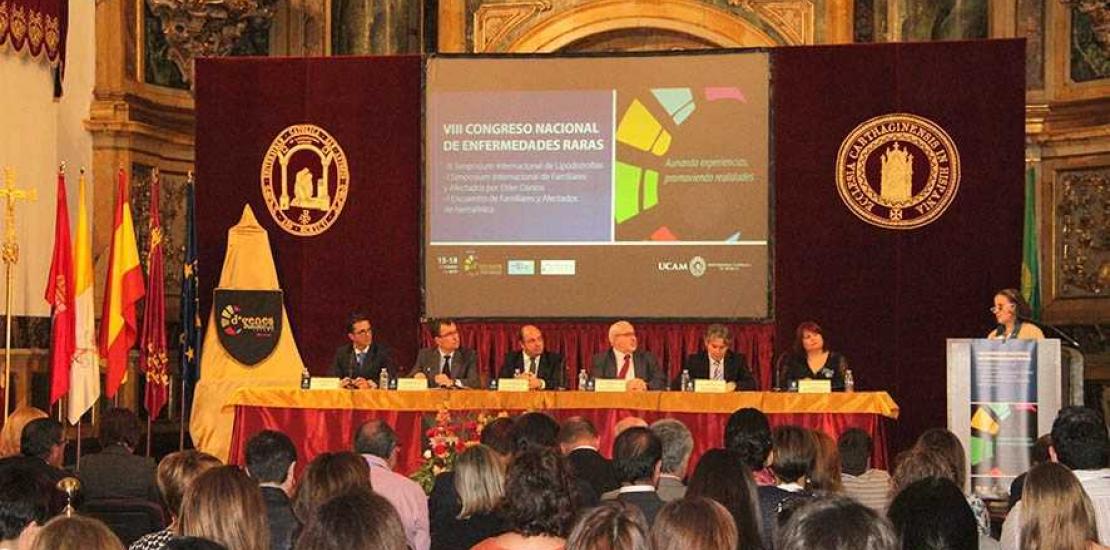A pilot program to accelerate the diagnosis of rare diseases
The Secretary General of Health announced during the inauguration event of the VIII National Congress of Rare Diseases, celebrated at UCAM, the implementation of a pilot program to accelerate the diagnosis of those diseases.
With a completely full Monastery Temple of Los Jerónimos began the National Congress for Rare Diseases,organized by the Association of Rare Diseases D’Genes, with the collaboration of the FEDER delegation of Murcia and the Association of Families and Affected of Lipodystrophy (AELIP), which celebrates its VIII edition on the Campus of Los Jerónimos. In the opening act intervened Pedro Antonio Sánchez, president of the Region of Murcia; Rubén Moreno, secretary general of Health and Consumption; Juan Carrión, president of the Spanish Federation of Rare Diseases (FEDER); José Ballesta, mayor of Murcia; José Luis Mendoza, president of UCAM; and Naca Eulalia Pérez de Tuleda, president of the Association of Families and Affected by Lipodystrophy (AELIP). Moreover, Encarna Guillén, health counsellor, also assisted to the inauguration. About 800 people signed up to the Congress; around 500 will assist to it in person and the rest, coming from 16 different countries, will attend it through Internet.
The Secretary General of Health and Consumption announced the launch of a pilot program to accelerate the diagnosis of rare diseases. “800.00 euros will be invested in this pilot project in order to diagnose 1.000 people without diagnosis, and the objective is to found out the cause of the disease and progress on a solution”.
Integral Care Plan
The president of the Autonomous Community of the Region of Murcia ensured that, to successfully face these types of diseases, it is necessary to implement a new system of intervention, different from the one usually used, “and we already took some steps to accomplish it. In recent years, our Region became a landmark in diagnosis, treatment and research in those diseases”. Likewise, Pedro Antonio Sánchez reminded that a Plan of Integral Care to Rare Diseases in the Region of Murcia is currently being put together, aimed at guaranteeing specific resources, educational aspects that will facilitate curricular adaptation, and the development of standards educational environments. “A plan that also considers actions in the field of health, with a special emphasis on research, on diagnosis and on treatment”, he highlighted.
UCAM, 15 millions in research
FEDER’s president wished to highlight the importance of the investment in research: “we are talking about future and hope for the people and families who live with rare diseases” he ensured, and added that “this is an unresolved issue in our country”.
UCAM’s president confirmed his supports to the rare diseases associations and to the members integrating them, and pointed out that the University invested 15 millions of euros in research this year, mostly in the field of health; moreover, the institution created the Chair of Research for Rare Diseases, in order to advance in this area. “We allocate a significant amount of money and resources in this field in order for it to move forward. Juan Carlos Izpisua is currently researching in California, with the Chair he managed at the Catholic University, on the issue of rare diseases”.
Update on rare diseases
The afternoon session began with the round table “Update on Rare Diseases”, in which intervened various experts that exposed the latest news on some Rare Diseases: Feliciano Ramos (Cornelia de Lange Syndorme); María Juana Ballesta (Hypo-Hydrotic Ectodermal Dysplasia HED: update and therapeutical perspectives); María Del Carmen Martínez (Identification of genetic variants in patients with HED); María Barreda (Update on research in Acute Intermittent Porphyria); and María del Rosario Domingo (CACH Syndrome VWM).




